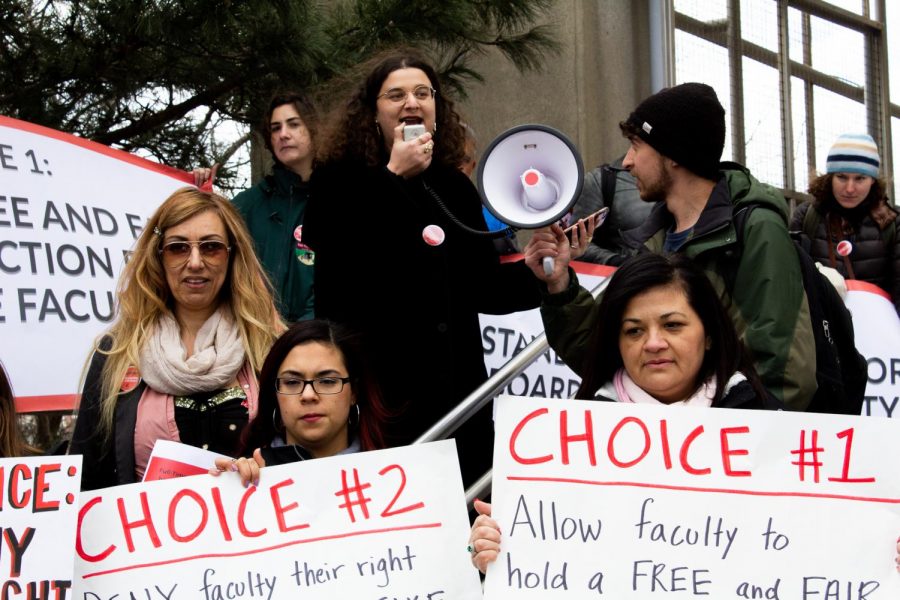NU faculty march for unionization with newfound community support
Progressive Student Alliance members led chants during the protest.
April 16, 2019
Northeastern’s full-time, non-tenure track faculty marched across campus April 10 in support of their right to hold a union election.
The march came a day after protesters refiled their petition stating their desire to vote on whether or not to form a union with the National Labor Relations Board, or NLRB. They withdrew their first petition when met with resistance from NU administration.
The full-time, non-tenure track faculty started working with Service Employees International Union Local 509, or SEIU, to advocate for their right to unionize last fall. Megan Piccirillo, the communications director of SEIU Local 509, said that SEIU represents service workers and teachers across Massachusetts and helps guide faculty organizers through the process of unionization.
“I think full time faculty are really just looking for a say in their work environment,” said Piccirillo. “Right now they don’t really have the academic freedom or really the ability to weigh in on what goes on in their classrooms.”
Piccirillo said that fair pay, fair benefits and better contracts are crucial to the full-time, non-tenure track faculty.
Brandon Sichling, an assistant teaching professor of game design, believes unionization could benefit not only the lives of faculty, but also the quality of education they provide.
“If we have more stability, that makes a difference in the students’ lives,” Sichling said. “While faculty may not necessarily feel the need for this themselves, I see it as a need for my students.”
Sebastian Stockman, an associate teaching professor of English, said many full-time, non-tenure track faculty members take on extra classes. His position requires him to teach three classes per semester, but he said he often teaches a fourth course to help support himself.
“If you’re teaching more students, then you have less time for each individual student,” Stockman said.
By having a union to advocate for a better salary, Stockman said he believes he could teach his students more effectively. This is one reason why unionization supporters are encouraging their colleagues who oppose unionization to be open to the idea of an election.
“The union helps everyone, regardless of their interest in joining or not,” said Aaron Block, an associate teaching professor of English. “We’re looking to make work better for everyone in the community, including faculty of all ranks.”
Since their first petition for a union election, full-time, non-tenure track faculty at NU garnered support from both the community and political leaders. Sen. Elizabeth Warren wrote a letter supporting unionization to President Joseph E. Aoun in December. Members of the Boston City Council also wrote to Aoun on behalf of the full-time, non-tenure track faculty in March and passed a resolution on April 10 urging NU to allow a union election.
In a March 11 letter obtained by The News, John Tobin, the vice president of Northeastern’s City and Community Affairs Office, responded to the Boston City Council and denied blocking unionization efforts.
“SEIU is certainly free to restart the election process at any time,” Tobin said in the letter.
Piccirillo said this response has encouraged SEIU to refile the petition with the NLRB.
Many supporters of unionization attended the march. Olivija Liepa, a first-year media and screen studies and English combined major, works with the NU Progressive Student Alliance to support faculty rights and came out to the march to support the full-time, non-tenure track faculty.
“They say ‘[Faculty] working conditions are our learning conditions,’ and I strongly agree with that. You shouldn’t just sit by and let people get mistreated like that,” Liepa said.
Many graduate students who work at NU are also trying to unionize and attended the march in solidarity. Tim Larock, a network science graduate student, said full-time, non-tenure track faculty are in a similar situation to him and fellow graduate students.
“What we want is to take some of [Northeastern’s] power and sit as equals with them and decide democratically through union contracts how [our] benefits get set,” Larock said.
Many people not affiliated with NU also attended the march, including union members of other professions and religious leaders like Reverend Vernon Walker of the Berachah Church.
“This is a classic example of an attack on workers rights,” Walker said. “[Unionization] helps protect employees from unfair treatment in the workplace.”
With all their newfound support, full-time, non-tenure track faculty are hopeful that a union election is in the near future.
“I’m looking forward to seeing how the administration will respond this time with that increased pressure and response from the community,” Block said.







